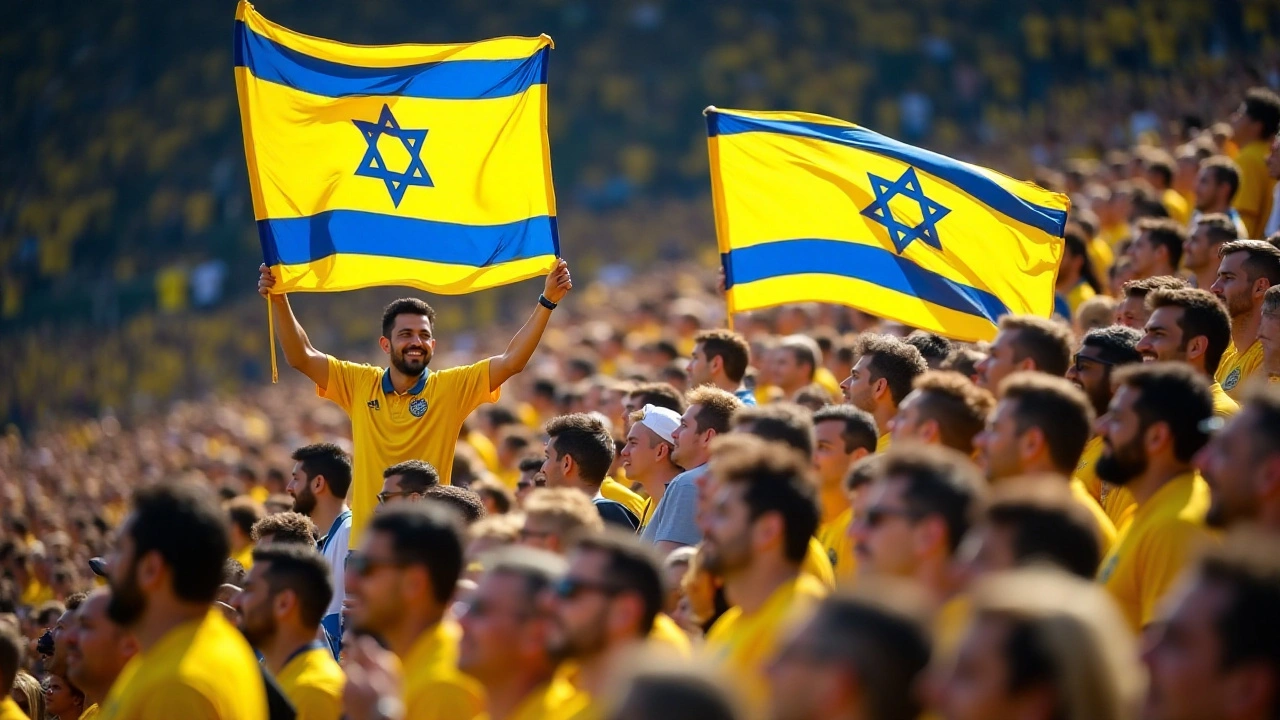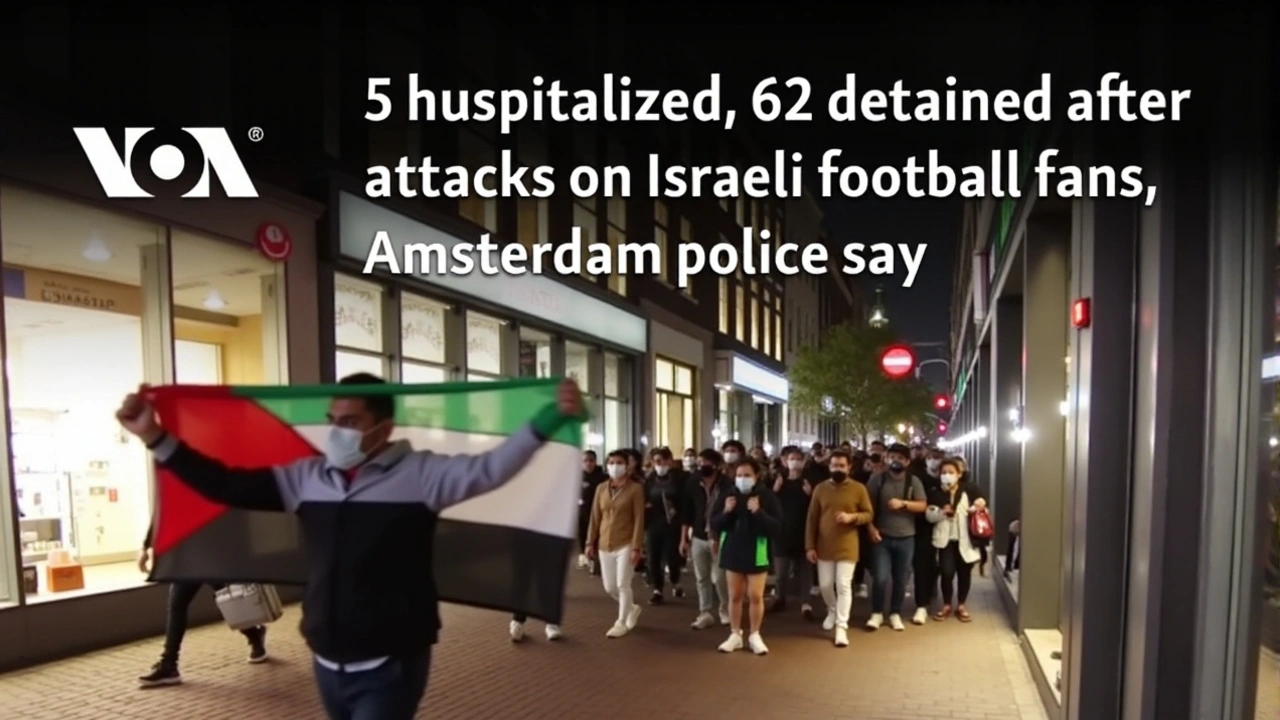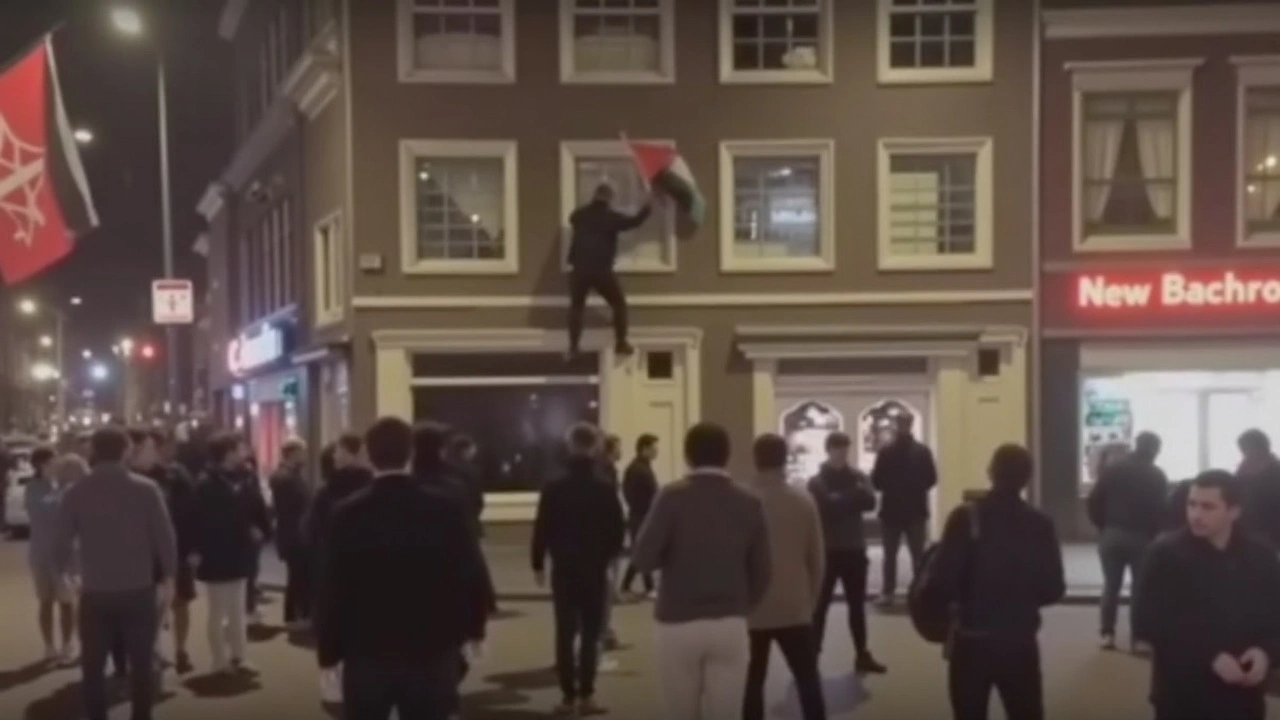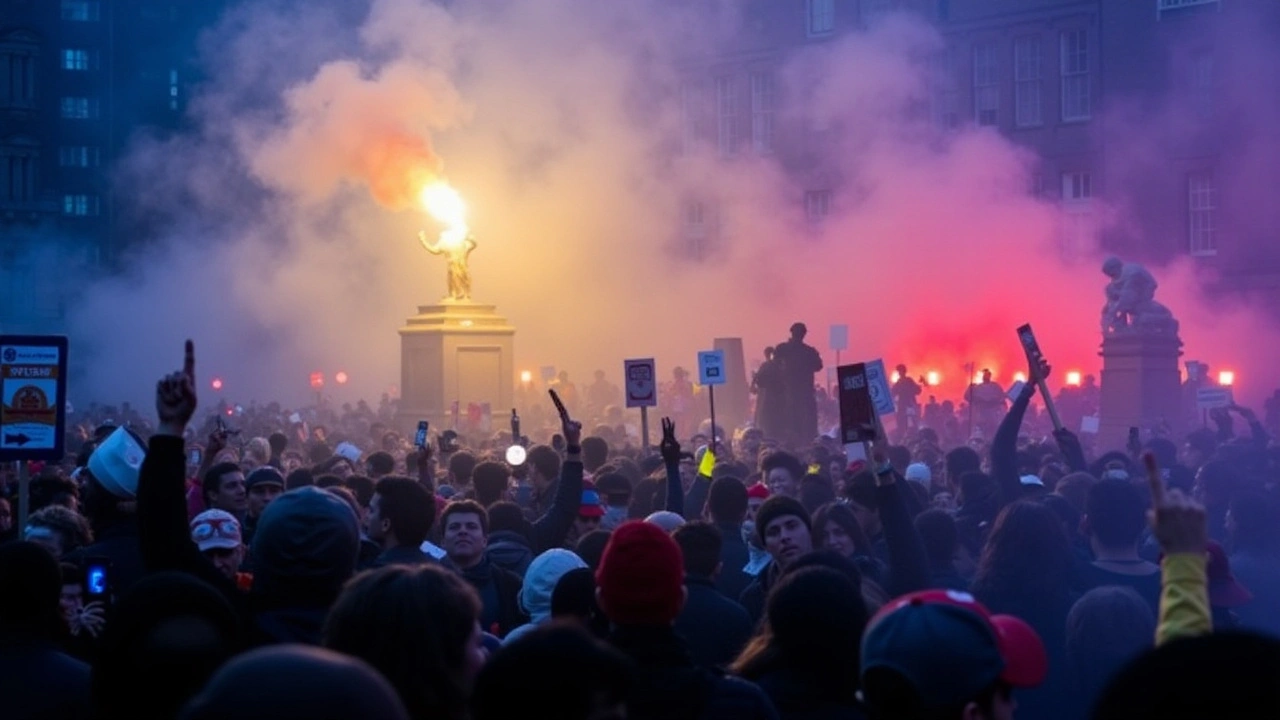Clash in Amsterdam: When Football Meets Political Activism
On November 8, 2024, the picturesque city of Amsterdam, known for its scenic canals and vibrant culture, became the unlikely stage for a fierce confrontation between Israeli football fans and pro-Palestinian protesters. This incident, which unfolded near the iconic Dam Square, has raised questions about the intersection of sports, political activism, and international tensions.
The trouble began when a large group of Israeli football enthusiasts descended upon the European city to cheer their team in an eagerly anticipated UEFA Champions League match. Galvanized by a sense of national pride, these fans carried with them emblems that symbolize their national identity, including Israeli flags and other cultural insignia. What was meant to be a festive occasion quickly turned contentious as they encountered a protest aimed at denouncing Israel's policies towards the Palestinian territories.
From Celebration to Conflict
As the Israeli supporters made their way through the bustling streets of Amsterdam, they were met by a group of individuals holding a demonstration that was deeply critical of Israeli governmental actions. The protestors, waving banners and chanting slogans, sought to bring attention to what they view as persistent and systemic issues impacting Palestinians. This convergence of opposing narratives escalated as both sides engaged in a heated exchange.
It wasn't long before the situation spiraled into violence. According to witnesses, tempers flared and physical skirmishes broke out. The police, tasked with maintaining order, were thrust into the chaos, attempting to de-escalate the conflict as tensions flared. In the aftermath, reports circulated of both fans being attacked and several protesters being taken into custody, underscoring the volatility of the incident.

Condemnations and Calls for Calm
The clash rapidly garnered attention not only on Dutch soil but internationally as well. This has prompted responses from both Israeli and Dutch officials who were quick to issue strong statements condemning the violence. An official statement from the Israeli embassy in the Netherlands voiced concern for the safety of Israeli nationals, urging peaceful engagements and mutual respect.
Meanwhile, Amsterdam's mayor, Femke Halsema, addressed the issue with a clear message: such violence has no place in her city. Highlighting the values of tolerance and inclusivity that Amsterdam holds dear, Halsema’s statement reflects an urgent call to prevent future incidents, urging the necessity for coexistence despite differing viewpoints.

Historical Context of Tension
This altercation can be seen as part of a broader pattern, a reflection of the sustained tensions between Israeli and Palestinian advocates that have periodically flared up across Europe. Football, with its unparalleled global reach, finds itself at the center of such frictions, serving simultaneously as a unifying force and a lightning rod for deep-seated animosities.
Football matches, particularly those on the international stage like the UEFA Champions League, transcend beyond mere sport. They become a platform where fans project their national identities, yet are also vulnerable to political exploitation. Given the high-profile nature of these events, they inevitably attract attention and sometimes unwelcome confrontations.
The Role of Law Enforcement and Investigations
In light of the clashes, law enforcement agencies in Amsterdam have been busy piecing together the complete picture of what transpired. The police, recognizing the significance of the unrest, have embarked on a comprehensive investigation. This involves analyzing video footage and eyewitness accounts to identify those responsible and properly address the legal ramifications of such actions.
What remains clear is the complexity of the task at hand. Amsterdam police face the challenging responsibility of preserving both public order and the right to peaceful protest, an intricate balancing act that requires diligence and a protective stance towards civil liberties.

Future Ramifications and Dialogue
This incident, though framed within the context of a specific event, adds to a persistent narrative demanding broader conversations on international political dynamics and their expression through global sports. Both organizers and local authorities must reflect on how to better facilitate safe encounters between diverse groups under contentious circumstances.
Looking forward, there is a concerted need for dialogue, encouraging greater understanding between communities that often find themselves at odds. Whether through community outreach, cultural exchanges, or educational initiatives, opportunities exist to bridge divides and foster an environment where differing perspectives can not only coexist but thrive.
As investigations continue and discourse evolves, there lies a fundamental truth: the world of sports, intertwined with politics, serves as both a mirror and a bellwether for societal currents. It demands awareness, patience, and a readiness to address the inevitable challenges it presents, aiming always for peace and mutual respect.

Julius Brodkorb
November 9, 2024 AT 08:07Wow, it’s crazy how a football match can turn into a flashpoint for geopolitics. I get why fans want to show pride, but the streets of Amsterdam aren’t a battlefield. We need to remember that there’s room for both celebration and protest as long as nobody gets hurt. Let’s keep the vibe respectful and let the police do their job.
Juliana Kamya
November 10, 2024 AT 06:21In the grand tapestry of sport, the threads of identity and dissent are woven together in a spectacular clash of ideals. When supporters don the tricolor and chant, they’re expressing a narrative that stretches far beyond the ninety minutes on the pitch. Meanwhile, activists raise their voices, brandishing banners that echo centuries of struggle and yearning for justice. It’s a theatre where every chant, every flag, every banner becomes a symbol of deeper truths that the world can’t ignore. The Dutch backdrop only amplifies the drama, turning a simple derby into a global conversation.
Erica Hemhauser
November 11, 2024 AT 04:34Mixing sports with political aggression undermines the very spirit of fair play. If you’re cheering for a team, keep the hostility out of the streets.
Hailey Wengle
November 12, 2024 AT 02:47What we’re seeing is a coordinated infiltration by anti‑Israeli agitators!!! They weaponize the chaos to push a hidden agenda that the mainstream media refuses to expose!!! The so‑called “pro‑Palestinian” crowd is a front for broader destabilization efforts!!!
Maxine Gaa
November 13, 2024 AT 01:01Football, at its core, is a shared human ritual that transcends borders, yet it becomes a mirror reflecting our deepest divisions. When the stadium transforms into a protest ground, it forces us to confront the uneasy overlap between passion and politics. Is it inevitable that collective joy will be hijacked by collective grief? Perhaps the answer lies in creating spaces where both can coexist without violence. Dialogue, after all, is the silent referee we all need.
Katie Osborne
November 13, 2024 AT 23:14It is incumbent upon all parties to observe the principles of civil discourse, particularly within a cosmopolitan setting such as Amsterdam. The convergence of fervent supporters and impassioned demonstrators demands a measured response from law enforcement and civic leaders alike. By upholding the standards of mutual respect, we may safeguard both the celebration of sport and the expression of political sentiment.
Kelvin Miller
November 14, 2024 AT 21:27The incident underscores the necessity for clearer crowd‑management protocols during international fixtures. Coordinated liaison between club officials and local authorities could mitigate future flashpoints. Implementing such measures would preserve the integrity of the event while protecting public safety.
Sheri Engstrom
November 15, 2024 AT 19:41The footage from Dam Square reads like a fragmented documentary, each frame capturing a micro‑cosm of the broader conflict that has seeped into European public spaces. On one side, you have Israeli supporters branding themselves with flags, scarves, and the unmistakable fervor that accompanies any major UEFA Champions League matchup. On the opposite flank, protesters wield placards, chant slogans, and project the grievances tied to decades of geopolitical tension. The police, in turn, are thrust into a dual role: to protect the right to peaceful assembly while simultaneously preventing the escalation into overt violence. What makes this situation particularly volatile is the fluidity of identity; fans and activists often intermingle, blurring the lines between celebration and protest. From a sociological perspective, these events illuminate how sports serve as a proxy battleground for ideological struggles that would otherwise be confined to diplomatic chambers. Moreover, the Dutch tradition of tolerance is tested, revealing the delicate balance between free expression and public order. Even the architectural backdrop of the historic Dam Square adds symbolic weight, as centuries of openness clash with contemporary discord. Legal scholars argue that the right to protest is enshrined in European human rights frameworks, yet the right to safety is equally paramount. The resulting tension forces policymakers to navigate a narrow corridor of compromise. In practice, this translates to a higher police presence, deployment of crowd‑control barriers, and, at times, the controversial use of force. Critics contend that such measures may suppress legitimate dissent, while supporters maintain they are indispensable for preventing bloodshed. The media coverage, proliferating across social platforms, further amplifies the narrative, often reducing complex motivations to simplistic binaries. This oversimplification fuels polarization, prompting both sides to entrench deeper into their respective echo chambers. One cannot ignore the psychological impact on ordinary by‑standers, who are caught in the crossfire of chants, tear gas, and flashing lights. Ultimately, the incident serves as a stark reminder that when sport intertwines with politics, the stakes extend far beyond the final whistle, demanding a nuanced, multidimensional response from all stakeholders.
Prudhvi Raj
November 16, 2024 AT 17:54Fans bring the heat and protests bring the fire it’s a clash of vibes
jessica zulick
November 17, 2024 AT 16:07The echoes of chanting fans reverberated through the canals, intertwining with the impassioned cries of demonstrators. In that fleeting moment, Amsterdam became a living canvas painted with colors of allegiance and dissent. While the police attempted to draw a line, the energy pulsed like a drumbeat that refused to be silenced. The incident, though unsettling, showcases how sport can act as a catalyst for broader societal conversations.
Partho A.
November 18, 2024 AT 14:21The confluence of supporters and protesters in a historic urban setting presents a unique challenge to municipal authorities. A measured, transparent approach to law enforcement can mitigate potential escalations while respecting constitutional freedoms. It is imperative that future events incorporate structured dialogue between organizers and community representatives.
Jason Brown
November 19, 2024 AT 12:34From a lexicon standpoint, the terminology employed by both factions reveals a lexemic contest that belies the underlying sociopolitical dynamics. One must appreciate the linguistic choreography that frames each side’s narrative, replete with performative rhetoric. Nonetheless, the primary concern remains the preservation of civil order amid competing expressive liberties. In essence, the episode underscores the need for calibrated policy interventions that honor both democratic expression and public safety.
Heena Shafique
November 20, 2024 AT 10:47Ah, the timeless tradition of turning a football celebration into a diplomatic summit-how utterly novel. One might suggest that even the Rijksmuseum could have anticipated such a masterclass in cultural exchange. Nonetheless, the city’s commitment to tolerance remains impressively consistent, even when the streets resemble a televised debate.
Patrick Guyver
November 21, 2024 AT 09:01Yo, this was like a massive mashup of soccer hype nd protest vibes all in one spot. People were yellin, flags waved, then boom-some dude tossed a bottle. Police tried to keep it chill but things got real fast. Guess when passions run high, chaos is kinda inevitable.
Jill Jaxx
November 22, 2024 AT 07:14Let’s channel that energy into building bridges, not breaking them.
Jaden Jadoo
November 23, 2024 AT 05:27The night fell, the chants rose, and the ghosts of old grudges whispered louder than the crowd. It’s a reminder that history never truly folds away.
Traci Walther
November 24, 2024 AT 03:41What a whirlwind! 🌪️ The stadium vibe turned into a full‑blown drama scene!!! 🎭 Emotions were sky‑high, and the city lights seemed to pulse with every chant!!! Let’s hope the next match brings peace, love, and maybe fewer fireworks 🎆!!!
Ricardo Smalley
November 25, 2024 AT 01:54Nothing says “global unity” quite like a few thousand fans turning a historic square into a micro‑warzone. At least the tourists got a free lesson in conflict resolution-courtesy of the Dutch police. Maybe next season the clubs will issue “peace jerseys” to keep things classy.